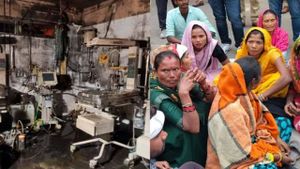Human Rights Watch (HRW) has dropped a bombshell, accusing Israel of committing war crimes and crimes against humanity during its military operations in Gaza. The report, released earlier this week, caught the attention of global media, ringing alarm bells over the severity of alleged violations occurring within the besieged Palestinian territory. This study by HRW sheds light on the rampant forced displacement of Palestinians, which the group claims has been systematic and deliberately executed by Israeli forces.
The staggering death toll from the conflict is now reported to exceed 43,000, with local health officials indicating the majority of fatalities have been women and children. The displacement of approximately 90% of Gaza's population adds to the narrative of overwhelming humanitarian crises, with many fleeing multiple times due to the relentless assaults. The severe damage inflicted upon civilian infrastructure—specifically the destruction of roughly two-thirds of homes—has also been documented by United Nations assessments.
"We have seen evidence of widespread forced displacement and systematic violation of the rights of Palestinians, entirely lacking any plausible military justification for such actions," said Nadia Hardman, HRW’s refugee and migrant rights researcher. The report claims the Israeli government, through orders for evacuation, has endangered lives, forcing individuals to leave their homes without any assurance of return, which, according to HRW, constitutes ethnic cleansing.
On the flip side, Israeli officials have vehemently dismissed these accusations, labeling the HRW report as filled with anti-Israel bias and factual misrepresentations. The Israeli Foreign Ministry spokesperson, Oren Marmorstein, stood firm, asserting, "Time and again, Human Rights Watch's rhetoric is completely false and detached from reality." He emphasized the military's operations are strictly aimed at neutralizing Hamas's capabilities rather than targeting the civilian population.
Even as HRW labels the situation as one of ethnic cleansing, the Israeli military’s narrative revolves around the need to conduct operations within Gaza for security purposes. This stance was reiterated by military spokespersons who argue their actions are legitimate military strategies executed during active combat against Hamas.
The U.S. government has also waded deep, with State Department spokesperson Vedant Patel rejecting claims of genocide and crimes against humanity as alleged by various UN bodies and HRW. Patel emphasized during briefings to the media, “We think these accusations are unfounded, and we have not seen evidence of forced displacement of Palestinian civilians.”
Patel did agree, though, on the need for protecting civilians, positing the question of the legality and morality under international humanitarian law. He pointed to how evacuations might be necessary depending on military contexts, stating, “It is wholly consistent and acceptable to ask civilians to evacuate certain areas during military operations.”
Meanwhile, the call for international accountability is palpable. HRW has urged countries to suspend arms sales to Israel to prevent complicity in purported war crimes. The organization believes enabling military operations without checks constitutes complicity, arguing nations would share responsibility for atrocities committed during armed conflicts.
Adding to this, European Union officials are also reconsidering their diplomatic engagements with Israel. Josep Borrell, the EU's foreign policy chief, has announced plans to propose suspending political dialogues with Israel, citing serious human rights concerns over the situation.
This back-and-forth has sparked protests and dialogues across the globe about the moral and ethical obligations nations have toward protecting human rights, particularly amid armed conflicts. Activists have pointed out the need for preserving civilian lives and holding entities accountable for violations of international law.
While political leaders debate the veracity of these claims and the extent of military operations, the plight of ordinary Gazans remains dire. With homes destroyed, families uprooted, and basic necessities in scarce supply, the humanitarian fallout from this conflict looms large.
The debate over Israel's military actions continues as human rights organizations rally for international intervention and reevaluation of support for Israel. Calls for increasing humanitarian aid for the beleaguered population and maintaining the spotlight on alleged war crimes have never been so urgent, as global advocacy groups push back against what they describe as systemic injustices.
The growing humanitarian crisis paints a stark reality of the consequences of military operations on civilians as political discourse swirls with accusations and dismissals. The situation remains fluid, with organizations advocating for swift action to alleviate suffering and reinstate human rights.
Activists have increasingly turned to social media to spread awareness, urging the world not to forget the lives caught between geopolitical narratives and state actions. They highlight personal stories of loss, resilience, and despair within the larger narrative of the conflict, ensuring the faces behind the statistics remain humanized.
A delicate balance between international law, humanitarian needs, and military strategy remains at the forefront of global discussions as new reports emerge, shedding light on one of the most complex and visceral humanitarian crises of our time. The world watches, and the pressure mounts to create pathways for peace and accountability as the fires of conflict ravage Gaza.
The recent statements and counter-statements from global leaders and local officials indicate this conflict is far from over and will require both resourcing and commitment to mend the wounds inflicted upon the people of Gaza.
It is imperative to recognize the multifaceted nature of the situation, where military actions meet human rights concerns, and the international community is called to respond thoughtfully, focusing on humanitarian needs without compromising on justice.
What remains evident is the call for dialogue, transparency, and responsibility—essential components for any pathway toward healing the deep-seated wounds of this protracted conflict. The call for humanitarian aid and support for protections against human rights violations must form the cornerstone of international response as the situation develops.
The world is watching closely, demanding accountability, and waiting for meaningful interventions aimed not just at addressing the current crisis but also at instituting long-term change for the millions whose lives hang precariously on the edge of conflict.
The recent actions reflect not just geopolitical maneuvers but the pressing moral obligations of governments worldwide to not only advocate for peace but also actively support those enduring the consequences of war.
Time alone will tell if this latest round of scrutiny will prompt lasting change or continue to yield the tragic cycles of conflict and humanitarian suffering, as echoed through the cries of the forgotten and the pleas for justice and safety from the affected populations.
The situation serves as a stark reminder of the gravity of human rights issues faced globally, necessitating unified action to safeguard the dignity and rights of every individual, overshadowed by political agendas.
The dialogues around Gaza will undoubtedly continue to evolve, shaped significantly by the narratives spun from both ground realities and political rhetoric, urging all stakeholders to keep the human cost of conflict front and center.



